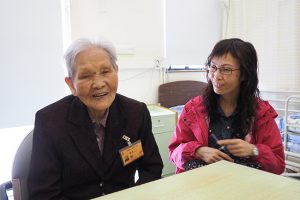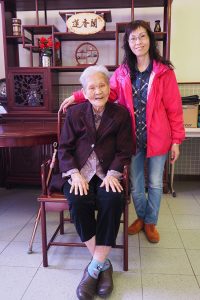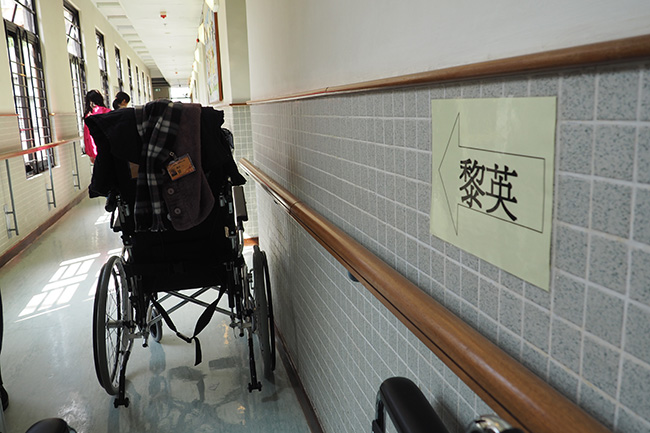Touching Stories
Oi Lian asked, ‘How many children do you have?’
Aunt Ying fiddled her hair, pondered then said with a grin ‘I can hardly recall …’
Lai Ying (Aunt Ying), 89, a dementia patient for 10 years, has been living in the Tung Wah Group of Hospitals Care and Attention Home (the TWGHs Home) for 5 years.
‘Mother still recognizes us as her family. She is happy to see us but might forget our names sometimes’, Oi Lian, her daughter gently said.
Forgetful, but not forgetting. The mother-daughter bonding still ties them intimately.

‘I have 8 siblings and we’re all close with mother’, continued her daughter. ‘Since the living environment in the resettlement estate was complicated when we were young, mother was very strict in parenting; but we were still grateful to her. Mother used to prepare two full table of dishes when all family members came home for festive celebrations. We all agree that she is a competent mother.’ However, every capable mother will age one day. Dementia has transformed this once talkative, sociable and active mother from a caretaker to a care-receiver, who needs assistance in many aspects.

After the incident of Aunt Ying nearly getting lost, her family reluctantly sent her to the TWGHs Home. She had problems in adaptation at the beginning of her stay. ‘At first, mother could not adapt to the new place. She often requested to go home and would try sneaking out of the Home alone. If she was stopped by a staff, she would turn emotional and sit on the umbrella rack besides the entrance and behave atrociously or grab the door handle tightly. I was worried and distressed, wondering if the Home could arrange for her to live on the first floor instead of the ground floor, so as to reduce the chances of her dashing to the entrance. But I was afraid of bringing extra workload to the staff, so I didn’t voice out my wish. Surprisingly, a social worker at the Home approached me for the same arrangement!’ Oi Lian recalled.
Dementia patients are often emotional. Aunt Ying’s temper is just like the unpredictable weather. Any trivial matter could trigger her to throw a tantrum. She sometimes even tried raising her cane to attack people. Caregivers and social workers at the Home had to closely communicate with Oi Lian to handle her problems. ‘I realized that her ill temper sometimes could have been caused by a bad night’s sleep, that she had awakened and wandered along the corridor’, added her daughter. ‘I would pay more attention to her when I visited her. Staff members would arrange for her to take a walk, eat some snacks or watch television for relaxation.’
Aunt Ying would easily get lost trying to find her room because of her deteriorating memory; therefore, the Home has set up a ‘Lai Ying Street’ on the first floor corridor for her. Signage of ‘Lai Ying’ are put every few meters apart in the hallway to allow her to follow it and lead her to her room more easily. In addition, to increase the sense of belonging of Aunt Ying to her room, her family put up different family photos and activity photos of the Home on her bedside. Her favorite ones are photos of her great-grandchildren.
The Home is equipped with special facilities to help dementia patients with similar problems as Aunt Ying, such as the Radio Frequency Identification (RFID) System, RFID tags on patients’ clothes, 3D Wall Paper at the entrance for decoration as a disguise to reduce opportunities of them leaving the Home and get lost on their own. Professional teams at the Home would make use of materials with different textures in the training to stimulate the sensory abilities of the elderly. During Reminiscence Therapy, the elderly is encouraged to express feelings to recall their past memories. This helps preserve both their communicative ability and the present memory. Beds with turning mattresses are in place to cater to the needs of the physically weaker elderly to help turn their bodies regularly for pressure release from prolonged bed rest and to prevent pressure sores.

Your donations would make a difference to the services of TWGHs. We sincerely invite you to join “Friends of Tung Wah” Monthly Donation Scheme. The monthly contribution would benefit more the elderly and the vulnerable communities in need.
